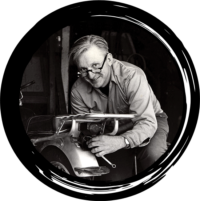Today 24th April is the 8th anniversary of Robert Pirsig’s death, and it is poignant that David Chadwick of Cuke shared the podcast of his conversation with Wendy Pirsig just a few days ago. David first met Wendy in 1979 at the funeral of murdered stepson Chris at the San Francisco Zen Center where Chris had been living. Cuke is an archival site run by David, dedicated to the life and work of Shunryu Suzuki and those who knew him.

As well as the family history, David and Wendy discuss both historical and contemporary Buddhist themes, including editorial work on Suzuki’s lectures and how Wendy became involved with the Cuke Archives during the pandemic. Wendy spent thirty years as an archivist and writer, producing extensive web-based history content for the Old Berwick Historical Society’s Counting House Museum in Maine. A few years ago, she compiled and edited the posthumously published collection of her late husband Robert Pirsig’s writings, On Quality: An Inquiry Into Excellence: Unpublished and Selected Writings.
“I always had a soft spot for archives. I’ve done museum work for years and years and I’ve really value how the archival records helps history, helps people understand things, and so I had an affinity for everything you were doing in Cuke.com and making it accessible to people.”
Wendy also reflects on her reconnecting with Zen practice.
“I’m going though a time in my Zen practice where I think about and wonder about what I understand .. I’ve gotten to think a lot about what is that I know and how did I know it or how did I learn it.”
She also shares how her correspondence was sparked by the rediscovery of letters to and from Marian Mountain, author of The Zen Environment: The Impact of Zen Meditation (William Morrow and Co., 1982). Marian’s striking book is dedicated to Shunryu Suzuki Roshi and features an introduction by Dainin Katagiri Roshi (of the Minnesota Zen Meditation Center) and a foreword by Robert M. Pirsig, who wrote:
“Zen literature seems at times to divide into two groups of works: those that are about zen; and those that are zen itself, talking. The first group is often precise, authoritative, and highly pedigreed but lacks a certain warmth and settledness. The second is often inaccurate, poorly composed, vague at times but has a special sound which you can recognize as the real thing. It is the sound of someone singing a song he himself has composed and which no one else can ever quite imitate. That is what we have here.”
David Chadwick’s book Tassajara Stories: A Sort of Memoir/Oral History of the First Zen Buddhist Monastery in the West―The First Year, 1967 is scheduled for release in September 2025.
=====
Discover more from The Robert Pirsig Association
Subscribe to get the latest posts sent to your email.

I remember reading “Zen and the Art of Motorcycle Maintenance “ it seems like a century ago . I think it was before I met my then 22 year old wife who is 6 years younger than me and had only once been outside of California but had amassed vastly more experiences by that young age than I had before or after meeting her. Now both retired and divorced for a quarter of a century, I recently met Wendy at a group meeting she led but had no idea of her history.
Thanks for sharing the memory BT